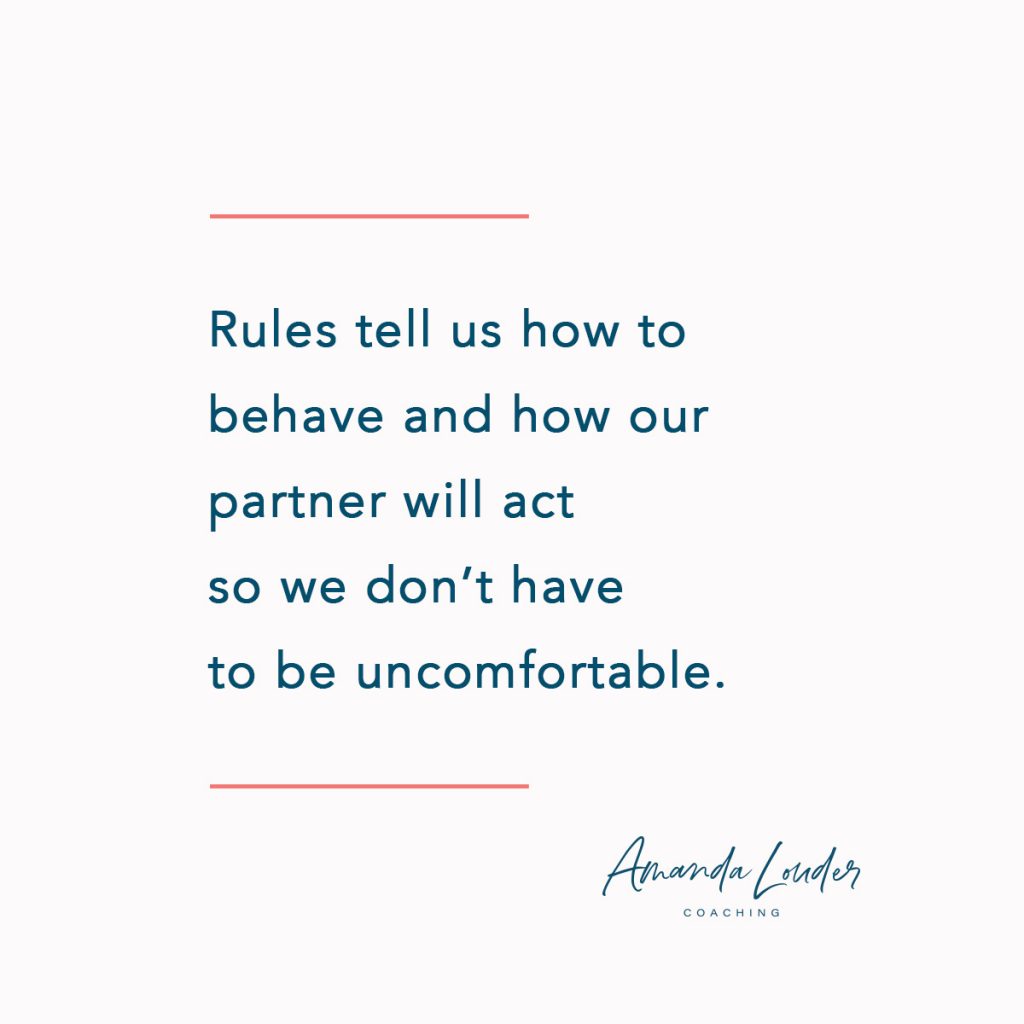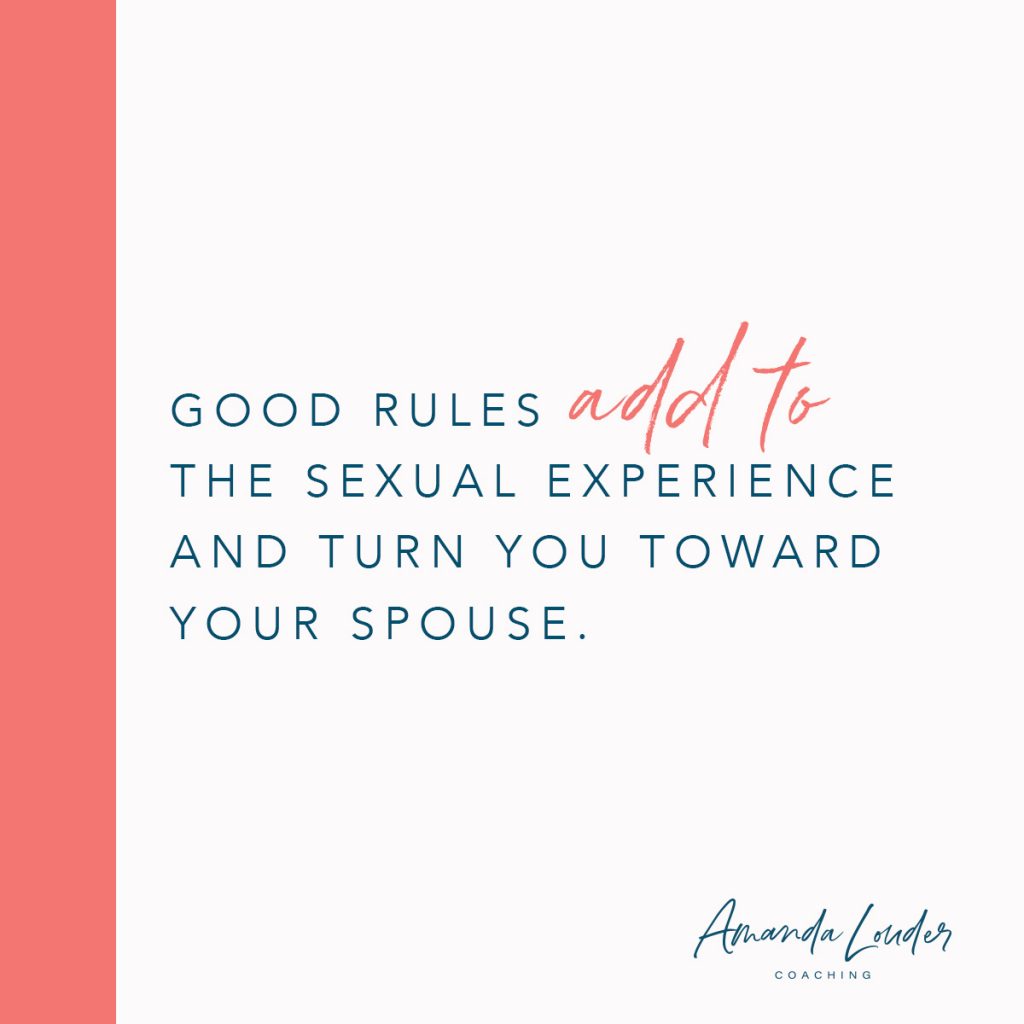
We all have rules and expectations with sex. It just comes with the territory. But many times, we aren’t even aware of the rules we have. They are unspoken. In this episode, we have a conversation about these rules, why we have them, what it can look like when we drop them or at least we are more intention about it. I’ll also share with you 10 essential rules I think all couples should consider.




Show Notes:
Follow Amanda on Facebook and Instagram.
Join Amanda’s Private Facebook Group.
References for this episode:
Living Within Reason
Show Summary:
Today we are going to talk about the rules we place either intentionally or unintentionally around sex.
We all have rules and expectations with sex. It just comes with the territory. But many times, we aren’t even aware of the rules we have. They are unspoken. In this episode, we have a conversation about these rules, why we have them, what it can look like when we drop them or at least we are more intention about it. I’ll also share with you 10 essential rules I think all couples should consider.
Why do we make rules?
What are rules, and why do we make them? The definition is a set of explicit or understood regulations or principles governing conduct within a particular activity or sphere.
So why do we make rules in our marriage and our sexual relationship? The biggest reason is to avoid discomfort.
We want to understand how we need to behave and how our partner is going to act so that we don’t have to experience any uncomfortable emotions.
We don’t want to be embarrassed, vulnerable, afraid, nervous, shocked, humiliated, distrustful, untrusted, desperate, rejected, anxious, awkward, belittled, and a whole host of other negative emotions. So we set up rules for ourselves and our spouse to avoid feeling any of those.
But, by the very nature of a sexual relationship, things can get uncomfortable. We are exposing the deepest part of ourselves, our whole self, to another person, which in and of itself can be very scary. So we set rules into play to minimize those uncomfortable feelings.
Rules
A lot of us have rules for when and where we can have sex and talk about sex.
- We can’t have sex at my parent’s house or your parent’s house
- We can’t have sex if we have house guests
- We can’t have sex if the kids are awake
- We can’t talk about sex (or anything of the kind) when the kids are around
- We can’t have sex when she is on her period
- Do not ever wake me up for sex
- Sex can only happen in our bed, with the lights off, at night, after the kids have gone to bed if I’m not tired, and only if I am in the mood.
I remember many, many years ago, watching an episode of Oprah. I think it was one of the very first episodes where Oprah brought on Dr. Phil. He was helping this couple who was struggling in their marriage because the wife was so controlling. He loved her, but she was so controlling of everything in their marriage, he was ready to walk away. One of the things she was so controlling about was around sex. I remember her saying that if he wanted to have sex, he needed to be freshly showered, shaven, teeth brushed, smelling good, and THEN maybe she would consider it. So he, trying to please her, would do all of these things, even though it was inconvenient, and then most of the time, she still turned him down. I really felt for the guy. But she had all these rules to help manage her anxieties around sex, instead of seeing it for what it was, him trying to show her how much he loved her. It was really sad.
It’s important to understand that rules can be one-sided and not necessarily shared. For example, “I will have sex with my husband once a week, but not more. If we’ve already sex once this week, I’m good until next week.”
Rules can be unspoken and just kind of develop over time — patterns of how we typically do things. You may have an unspoken rule of no oral sex just because you never do it. So if one of you, all of a sudden, wanted to do it, or tried to do it, it might seem like it’s coming out of nowhere and against the rules. Your partner might be upset or put off, just because it wasn’t spoken about beforehand.
Rules can come from bad experiences with sex. For example, if a woman was molested or raped, she may need her husband to ask for consent every time he wants to touch her. In these kinds of situations, it’s important to honor the rule, even if you don’t understand it because it can retrigger the trauma each time.
Rules can be internal and even kind of unconscious. Recently I was working with a couple on their sex life. The husband refused to give his wife oral sex, and she had no idea why. When we dug a little bit deeper, it was because the first time he did, she made a face that he interpreted was bad. So it was an internal rule for him not to do that anymore.
Rules can also be passed down from other generations. In many families, sex is never talked about. So as adults, we may not ever talk about it either.
Rules don’t have to be restrictive, and they can be something that is negotiated in a couple.
- Rules for preferences: No kissing after oral sex
- Playful rules: Whoever initiates get to choose the TV show that night.
- Rules for engagement: If something goes wrong, don’t talk about it at the moment, but discuss 24 hours later after emotions have calmed down.
The thing to remember is a good rule ADDS to the sexual experience. It turns you toward your partner. What brings us closer? What gives us pleasure? A bad rule takes away from the experience and turns you away from your partner. Talking about rules requires that you open up and be vulnerable, but overall it creates a fuller sexual experience.
So I want you to think about:
- What your rules for sex are. Spoken and unspoken. Intentional or unintentional.
- Why you have those rules? Do you like them? Why are they necessary?
- What emotions are you trying to avoid by having rules?
One of the things we talk a lot about in coaching is emotions and learning how to feel our feelings. Learning how to process emotions and not be scared of feeling anything. When you understand what emotions are, where they come from, and how they can’t actually hurt you, then you aren’t afraid to feel any of them anymore.
The pain from emotions comes from
- Avoiding them, which doesn’t work because they always come back.
- Resisting them, which actually makes them stronger
- Reacting to them, which usually leads to more negative emotions.
The best thing to do with emotions is to allow them to be.
- Identify them for what they are.
- Understand what you are feeling and where it is coming from
- Sit with them until they pass
This is a process that takes effort but is so worth it. This is where true confidence comes from – the willingness to feel any emotion.
When Things Change
What happens when you’ve had a well-established rule in your marriage and sex life, and one partner wants to change things? Time to face the discomfort. Having open and honest communication about what each partner wants and needs in the marriage and the sexual relationship is very important. Without that constant communication, belief in the partners wanting the best for each other, then one tends to feel trapped or repressed, which never bodes well for the marital relationship.
Having that communication can seem scary, but if you can put aside your insecurities, it truly opens you up to a new depth of intimacy in your relationship.
Often, if you can adequately express those desires or expectations with your spouse, anxieties go away, or you can dig in a little bit deeper as a couple to figure out a more significant issue that you are having.
If you are finding yourself resistant to making changes or wanting to put more rules into place, I encourage you to explore that within yourself. If you need someone to help you do that, I would love to help you. This is one of the greatest things we do in coaching, exploring those thoughts and beliefs so you can decide what you want for yourself.
Often when we find ourselves wanting to put more rules into place, it is because we feel out of control with something. But the real power comes from within us. When we learn to control ourselves, we don’t feel the need to control all that is going on around us for us to feel safe.
10 Essential Rules For Sex
There are a few rules that I think are essential. Some are instinctual. Others have to be learned through experience. So let’s talk about them.
- Just because you are married doesn’t mean you have the right to have sex whenever you want. Consent is still needed even for married couples. What that looks like in your marriage may differ from other marriages. So have a conversation about what is ok and what isn’t.
- Wash your hands! You don’t want germs and bacteria getting near those body parts. Also, consider spicy foods on your hands and even essential oils. Peppermint oil on your hands is not so pleasant down south.
- Pay attention to your partner’s cues. If either one has trouble finishing, don’t just stop attempting to get them there and don’t rush them. Let them take the lead for when they are done. It’s your job to keep going until it happens or they wave you off.
- Discuss or figure out what works best for your partner and support them in that if possible. And I’m not saying “anything goes,” but “anything goes within reason.” If you or your partner finish better with masturbation or a vibrator, support them in that. Don’t take it personally. Just be there to connect with them continually.
- To avoid UTI’s, it is recommended that you always pee after sex. This helps flush all the bacteria out of the system.
- Don’t just lay there. Nobody wants pity sex. Nobody wants to feel like the other partner could care less. Do what you need to do to get yourself in the mood. And even if you aren’t in the mood, try to get yourself there. Your arousal is, for the most part, your responsibility. I was once at a girl’s night out where a bunch of ladies were talking about starfishing it. If you don’t know what that is, it’s when you just lay there, spread out, like a starfish, while your husband does what he wants. There’s no engagement. One woman even talked about scrolling through Instagram while her husband did his thing. Don’t do that! Even if you aren’t in the mood, be kind and sensitive and at least try to connect with your spouse. Have fun. Be vocal and lively. Most people don’t want to have sex with a lifeless body!
- Unless it’s spur of the moment sex, take some time to freshen up. Brush your teeth, put on some deodorant, and maybe a light spritz of perfume or body spray. Nothing too strong. Also, consider doing a good cleansing of your private parts, so they are clean and fresh as well. Cut your nails, wear clean underwear, and have something ready to clean up after.
- Be considerate of your plans for birth control. The fear of an unwanted pregnancy can really kill the mood.
- If someone says they are not comfortable with something, it ends there. You can discuss it later, but don’t push the issue at the moment. Consider creating a safe-word that means a hard stop, so even if what is happening is consensual at first, either partner can stop if wanted. Yes, some of the things we do during sex can be uncomfortable or at least very vulnerable. I would tell you to push through that if you can. But if you feel scared or unsafe, stopping is totally fine.
- Understand that sex is a skill. It takes time to learn and get good at. Sex can be awkward and funny. There are weird noises, passing gas, and any number of things happening. Laugh about it and keep on keeping on.
I have created a worksheet for you as a free download for the episode so that you can write down your rules, why you have them, and what emotions you might be trying to avoid. This is just a great place for you to do some introspection and see what’s going on in your brain.



